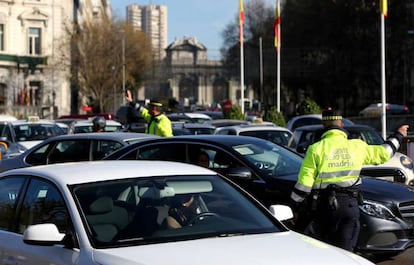Spanish government planning to ban sale of gasoline, diesel cars from 2040
The draft climate change law also includes a prohibition on the controversial method of “fracking,” and will encourage the use of renewable energies

A draft law covering Spain’s approach to climate change and the transition from fossil fuels to clean energy is expected to reach Congress before the year is out. But the Ministry for Environmental Transition has already informed the country’s political parties of some of the key elements of this legislation. And among the proposals is a 2040 ban on the sale of all vehicles that use fossil fuels, whether they be powered by gasoline, diesel or natural gas.
What’s more, in 2050 the government hopes to be working with local councils to prohibit the circulation of such vehicles, and is also proposing the obligatory installation of electric charging points in gas stations.
Road transportation is not progressing at the same speed in the fight against climate change
Transportation in Spain – and in most of the European Union – is the straggler when it comes to the fight against climate change. While the use of renewable energy continues to grow in the power sector – with a realistic target of 100% of electricity coming from clean sources in the future – road transportation is not progressing at the same speed in the fight against climate change.
Just over a quarter of all greenhouse gases emitted in Spain are from the transportation sector, and most of those come from the roads. Forecasts from the government suggest that if measures are not taken, these emissions will grow 15% from here to 2030.
In the draft text presented on Tuesday, the 2040 ban on “passenger and light commercial vehicles with direct emissions of carbon dioxide” would also mean an end to the sale of hybrids, which also burn gasoline or diesel. This kind of veto has already been announced in other EU countries, such as the United Kingdom and France, which have also set a target date of 2040, and Denmark, Ireland, Germany and the Netherlands, which have set a date of 2030.
The ministry claims that its objectives are very ambitious and go further than what has been demanded by the European Commission (EC)
The ministry’s proposal also includes measures that would see municipalities with more than 50,000 people have low-emission zones installed “no later than 2023.”
The law, which also sets a 20% reduction in greenhouse gas emissions by 2030 (compared to 1990 levels) will have to be negotiated in Congress, and given that the Socialist Party (PSOE) is governing in a minority, the process may take a long time as the government seeks cross-party support.
The PSOE and the left-wing anti-austerity party Podemos have already created a work group in Congress, and the rest of the political parties received the draft document several days ago. The ministry claims that its objectives are very ambitious and go further than what has been demanded by the European Commission (EC).
Among the measures in the draft is a plan to ban hydraulic fracturing, or fracking, a controversial process used to extract oil and gas from the ground by fracturing rock using pressurized liquid. What’s more, once the law comes into force the government will no longer issue new permissions for the prospecting and exploitation of hydrocarbons, neither on land nor at sea. Current licenses will not be valid from 2040 onward.
In 2017, clean technology generated 32% of all the electricity in Spain
The climate change law will be completed with the so-called Energy and Climate Plan, which Spain will have to present to Brussels in December. This plan will set out the energy sources that the country will count on over the next decade. For example, whether it will count on coal, nuclear or natural gas for its energy needs.
This document is still being drawn up, but in the draft climate change law there are measures to encourage the use of renewables. Between 2020 and 2030, a total of 3,000 megawatts will have to be installed every year. Currently, the country counts on 48,000 megawatts, and in 2017 this clean technology generated 32% of all the electricity in Spain.
English version by Simon Hunter.
Tu suscripción se está usando en otro dispositivo
¿Quieres añadir otro usuario a tu suscripción?
Si continúas leyendo en este dispositivo, no se podrá leer en el otro.
FlechaTu suscripción se está usando en otro dispositivo y solo puedes acceder a EL PAÍS desde un dispositivo a la vez.
Si quieres compartir tu cuenta, cambia tu suscripción a la modalidad Premium, así podrás añadir otro usuario. Cada uno accederá con su propia cuenta de email, lo que os permitirá personalizar vuestra experiencia en EL PAÍS.
¿Tienes una suscripción de empresa? Accede aquí para contratar más cuentas.
En el caso de no saber quién está usando tu cuenta, te recomendamos cambiar tu contraseña aquí.
Si decides continuar compartiendo tu cuenta, este mensaje se mostrará en tu dispositivo y en el de la otra persona que está usando tu cuenta de forma indefinida, afectando a tu experiencia de lectura. Puedes consultar aquí los términos y condiciones de la suscripción digital.








































